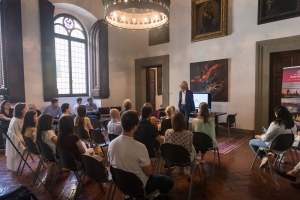Elio D’Anna, President of the European School of Economics, illustrate the burden of the new generation of jobseekers and the importance that institutions have in this matter. He claims:
“We need schools of freedom, international environments, practical and multicultural approaches that, in economicas much as in politics, educates a new generation of business leaders, a young ruling class, of practical dreamers able to harmonize the age long apparent antagonisms: economics and ethics, action and contemplation, financial power and love.”
For many graduates, finding a first job is a challenge. But, accordingly with ESE President Elio D’Anna: “unemployment does not exist, only a lack of preparation”.
The real question we should ask is: have their educational institutions actually prepared these students for the international job market?
Universities continue bringing out under-equipped graduates who have studied across the world but end up finding themselves taking jobs they do not want.
“A young person should be able to choose his job,” claims ESE President, “No one should be put in the position of accepting any job just to survive.”
According to D’Anna, to be entitled to that kind of right there is a great need of preparation first. Effective preparation for the job market involves a wide-ranging, expansive type of institution, it is not just about studying and passing exams. In other words, failing to prepare is preparing to fail.
ESE President argued that the European School of Economics believes in the right of every student of dreaming and seeing their dream come true. “Going to a job interview, trying to get chosen, waiting in line and looking for anything to do, and a boss who pays their wage, is beneath the dignity level of many graduates”, he says.
Across the Eurozone, the average youth unemployment rate is around 8.5%(Eurostat data) and across countries such as Germany, Norway and the Netherlands, with a stable economy, this number doesn’t even reach double digits. And yet, there are countries where levels of youth unemployment are significantly higher and where the majority of jobseekers suffer from a lack of preparation for the labour market. For instance, countries such as Italy, Spain and Greece reach a level of unemployment far above the average, respectively at 11.2%, 15.9% and 20.8%.
This difficult situation does not affect just Europe, is a global issue instead. As stated by D’Anna, “Permanent jobs continue decreasing all over the work year by year and, especially for young generations, finding a full-time job is becoming an impossible endeavour. They are constantly confronted by the harsh reality of not being able to cross the threshold into the labour market.”
Merrill Lynch’s recent report – Job Quality and Escape Velocity –claimed that it is possible to relate the fall of the unemployment rate in the Eurozone to an increasing number of people working for companies as freelancers.
Many international technology companies, such as Uber or Deliveroo, often offer a convenient job position with flexible hours. But, what they don’t necessarily offer are the benefits of a full-time job, alongside with a career progression or a long-term security.
The majority of graduates are facing this unemployment crisis also as a symptom of the poor preparation their educational institutions offered them, leaving them unprepared for a competitive business climate.
In Italy, young people graduate six years after their European colleague and with a lack of preparation so deep that cuts them out of the international word of work and leaves them with severe difficulties integrating into the Italian job market”.
What is that companies seek when they look at graduates applying for a job?
In the opinion of D’Anna, the labour market seeks for young graduates, with international preparation and job experience. However, most educational institutions do not provide the practical training or creative inspiration that are essential to a graduate’s career development and the fault lies with the obsolete programmes these universities are running. Most of these institutions, he claims, transformed into factories manufacturing classes of useless, impractical and under-skilled graduates.

It isn’t just about skills or an understanding of how companies work. According to ESE President, it is actually about ambition and “having exceptional mentors such as those at ESE who can offer support”. Without a team of teachers and trainers able to encourage and inspire students, a graduate has very little possibilities to be well prepared for a competitive work world.
All the institutions should commit to it and help to change the future of the young generation.




Leave a Reply
Want to join the discussion?Feel free to contribute!